Showing 37–48 of 77 results

Questioning modern methods of development, this volume discusses from the complex issues of cultural identity to the worldwide human problems stemming from the development-planners unmindfulness of endogenous cultures.
From the post-World War II decolonization to about mid-1980s, mainstream development thinking has focussed on economics, on the one-dimensional abstraction of homo economicus, to the exclusion of all else: specially the socio-cultural context in which development might take place. This divorce of development from culture, however, was poor economics a hard fact, which the international community has come to discover gradually. experientially. The United Nations too was not found wanting in its shared concern for culture. On 21 January 1988, it launched under the aegis of Unesco The World Decade for Cultural Development in its effort to chiefly (a) strengthen awareness of cultural dimension of development, and (b) enrich cultural identities the world over. In the Indian capital, the Indira Gandhi National Centrel for the Arts (IGNCA) has initiated a multidisciplinary discourse on development issues vis-a-vis the whole range of cultural variables and definitions. Which its newly-introduced series: Culture and Development proposes to cover in entirety. Integration of Endogenous Cultural Dimension into Development Volume 2 of the Culture-and -Development series takes the discourse on: from the complex issues of cultural identity to the worldwide human problems stemming from the development-planners unmindfulness of endogenous cultures. Carrying 17 presentations of a Unesco-sponsored workshop : 19-23 April 1995 at IGNCA, New Delhi, it questions the modern methods of development which, evolved from the experience of the industrialized world, have brought about neither peace nor harmony, neither alleviation of poverty nor socio-economic equality .Thus arguing why current development processes call for serious rethinking, the authors spell out not only the urgency of integrating endogenous cultural dimension into the paradigms of development, but also the relevance of linking development with the ethical basis of life and living. Also included in the volume are several case studies, with special reference to the Asian situation. The contributors to this volume are reputed scholars, planners and grassroots-level social workers from China, India, Indonesia, Japan, South Korea, Sri Lanka, Thailand, and Vietnam.
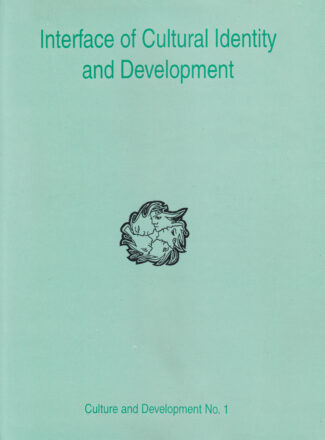
This volume highlights the basic distinctions between anthropocentric and cosmocentric approaches to cultural identity and development. It discusses what constitutes culture and development and focuses on evolving viable, alternative development paradigms.
From the post-World War II decolonization to about mid-1980s, mainstream development thinking has focussed on economics, on the one-dimensional abstraction of homo economicus, to the exclusion of all else: specially the socio-cultural context in which development might take place. This divorce of development from culture, however, was poor economics a hard fact, which the international community has come to discover gradually, experientially. The United Nations too was not found wanting in its shared concern for culture. On 21 January 1988, it launched under the aegis of Unesco The World Decade for Cultural Development in its effort to chiefly (a) strengthen awareness of cultural dimension of development, and (b) enrich cultural identities the world over. In the Indian capital, the Indira Gandhi National Centrel for the Arts (IGNCA) has initiated a multidisciplinary discourse on development issues vis-a-vis the whole range of cultural variables and definitions. Which its newly-introduced series : Culture and Development proposes to cover in entirety. This inaugural volume, thematically focussing on Interface of Cultural Identity and Development, comprises 23 presentations of a Unesco-sponsored meeting of experts: 19-23 April 1993 at IGNCA, New Delhi. Highlighting the basic distinctions that exist between anthropocentric and cosmocentric approaches to the question of cultural identity and development, the authors reflect on what constitutes culture and development not per se, but as an integral holistic notion of culture and lifestyle, culture and development, culture and region, culture and linguistic/ecological identities, and how some of the viable alternative development paradigms could be evolved from the convergence of mystical ancient insights and modern science. Authored by eminent anthropologists, sociologists, scientists and other area-specialists from Australia, Bangladesh, India, Indonesia, Iran, Mongolia, Nepal, Sri Lanka, Thailand and Turkey, the papers here not only consider diverse theoretical issues of cultural identity and development, but also set out case studies in different field situations.
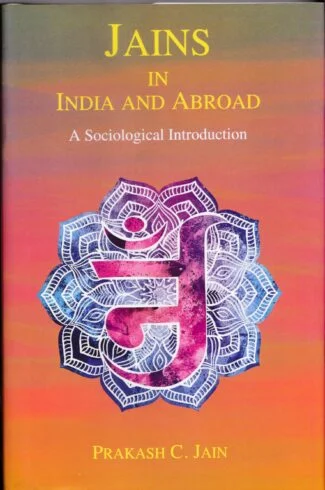
This book profiles the salient demographic, religious and sociological features of the Jain communities in India and abroad, be it their way of life, social identity, organizational features such as sects, castes, kinship, family and marriage, food, festivals and pilgrimage, Jain associations, or the status of contemporary Jain women along with their inter-ethnic relations, and the Jains’ historical and civilizational contribution to Indian culture.
Jainism, one of the oldest religions of the world, found its philosophy, rituals and ethical code in the teachings of Lord Mahavira, the twenty-fourth tirthankara of Jainism. Though its reach was confined only to the Indian subcontinent for more than two-and-a-half millennia, from the twentieth century onwards, it made its presence felt across the globe, mainly in the US, the UK, Europe, East Africa and Nepal, and in smaller numbers in many other parts of the world, through its diasporic population. This book thus profiles the salient demographic as well as sociological features of the Jain communities in India and abroad.
The Jains have been a minority community consisting of less than 1 per cent of Indian population in modern times. The current population of the Jains is estimated around six million. Its diasporic communities consist of about 300,000. Despite its miniscule size, the community’s contributions to the Indian society in different realms are quite commendable, be it education, trade and commerce, politics or in running and efficiently managing charitable institutions. Other demographic features include its high literacy rate, lowest infant mortality rate and appreciable sex ratio (954 in 2011). Their approach and attitude towards all living beings stand tall among all religious communities of the world.
The book further features other socio-religious aspects of the Jain community along with its way of life, social identity, organizational features such as sects, castes, kinship, family and marriage, food, festivals and pilgrimage, Jain associations, and status of contemporary Jain women. The economic and political status of the Jains, their inter-ethnic relations, and the Jains’ historical and civilizational contribution to Indian culture and society are also vividly addressed. It navigates scholars and researchers to a wide range of areas in Jain studies for further researches.
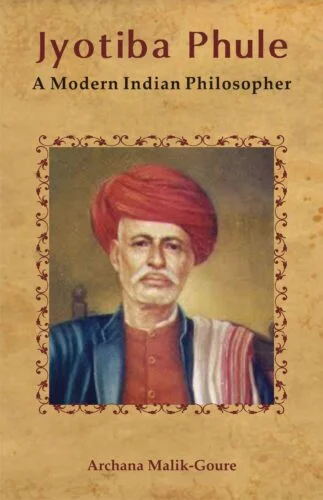
Jyotiba Phule, a multi-faceted social reformer of the nineteenth century, relentlessly worked for the uplift of the oppressed classes, having started schools for girls and children of the lower castes and farmers, widow homes and orphanages. His philosophy of universal religion strengthened him to fight against child marriage, sati and casteism, and for the remarriage of Brahmin widows.
Caste conflicts ruled the roost in the nineteenth-century India. It housed many social evils like untouchability, discrimination against women and the underprivileged, and sati. Education was the prerogative of the mighty Brahmins and the upper-class society, resulting in the perennial exploitation of the backward classes, women, farmers and widows.
Jyotiba Phule (182790) dawned as the saviour of the weaker sections. Defying diktats and intimidations, he got himself and his wife educated. This paved the way for the Phule couples to start and successfully run few schools for the children of the downtrodden and girls. He opened his well for the untouchables’ use. Through tireless efforts and continued writings, he fought against the social injustices, nail and tooth. His writings were a new philosophy in the making a philosophy of universal religion. He believed in God, but refused to believe the Vedas, saying them as the handworks of Brahmins.
Man was his religion and his emancipation was his drive. He founded Widow Homes and orphanages. For him education was the key for liberation from all social evils. He fought with the English regime to have the children of farmers and the downtrodden equal rights to education. He was eventually accredited with the title ßMahatmaû.
This book is sure to generate keen interest among social workers, modern historians, researchers on social reforms and reformers, and students of sociology and political science.
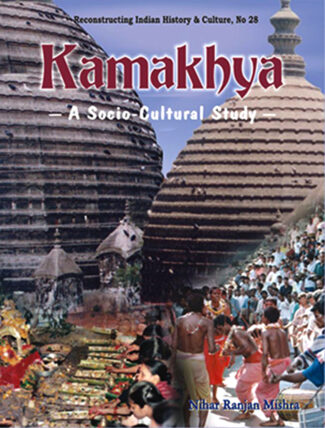
This is a comprehensive work on the Kamakhya temple complex in Assam: the complex processes of the deitys Sanskritization and the temples role in integrating the people of this region with the mainland. It makes a detailed study of the temple rituals, festivals and personnel and socio-cultural life and includes an account on spread of Saktism in the region.
This is a comprehensive work on the Kamakhya temple complex in Assam: the complex processes of the deity’s sanskritization and the temple’s role in integrating the people of this region with the mainland. Incorporating details from interviews with temple priests and other temple staff and from literary materials on the temple, it deals with the socio-cultural life at the temple complex with respect to rites of passage relating to marriage, birth and death, arts and crafts, food, dress and folk medicine. With illustrations of the temple structure and sculptures and religious and cultural activities, the text makes a detailed study of the temple rituals, festivals and personnel their kinds and functions and changes in the body of the temple staff with time. Importantly, it provides a background to the study by examining the spread of shaktism over different periods in the Eastern Indian region and specifically Assam.
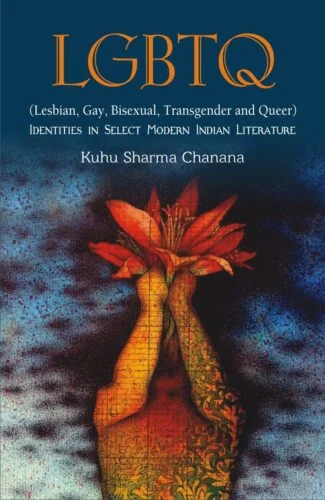
This book aims at developing an exclusive literary framework to analyse the Indian queer literary works. It helps in excavating the convoluted layers and subversive potential of queer identities, and in studying the efforts made by the Indian writers to homosexualize various so-called normative spaces.
The invisibility accorded to queer literary works in India has a systematic sinister agenda of silencing. Such a hidden target can be countered only by cataloguing the still unexplored queer texts in various Indian languages and by developing unique critical tools to analyse these texts in a such a manner that helps in excavating the convoluted layers and subversive potential of queer identities.
This book aims at developing an exclusive literary framework to analyse the Indian queer literary works. In all, there are seven chapters which deal with the themes of plurality of lesbian existence, ambivalent adaptation techniques adopted by the writers to grant visibility to subaltern sexualities, overlapping of class and homosexuality, the development of exclusive queer aesthetics by inversion of accepted mode of literary language, imagery and techniques, the doubly marginalized identity of lesbian diaspora and the specific rift between lesbianism, feminism and queer activism in Indian context as presented in literary studies.
It also deals with the issues of biphobia, violence on hijra identity (perhaps one of the most marginalized identity in LGBTQ movement), the depiction of symbiotic relationship between space, sexual identity and sexual citizenship in Indian literary texts and the efforts made by the writers to homosexualize various so-called normative spaces.

The studies show how the Himalayan pastoral nomads, Lakshadweep islanders and other peoples follow the spirit of the natural world in continuation of the primal vision by delineating their belief systems, knowledge of cosmology, etc.
As one of its significant programmes, the Indira Gandhi National Centre for the Arts (IGNCA) has, for sometime, focussed on the lifestyle studies addressing the fundamental questions concerning Mans relationship with Cosmic Order, his perceptions of Space and Time through the ages and across cultures, and his experience of Nature and how far he has evolved a symbiotic existential connection with it. The IGNCA has now launched forth a series of Pilot Studies which, through specific community studies, seeks to explore culture-ecology interrelationship in its myriad manifestations. Lifestyles and Ecology is the series first thematic monograph. With meticulous analyses of the lifestyles of the Himalayan pastoral nomads, the Lakshadweep islanders, and Kanyakumaris Mukkuvar fisherfolk, among others, the studies here show how these communities follow the spirit of the natural world: not in imitation, but in continuation of the primal vision. Delineating, thus, variegated cultural paradigms of these communities, with details like, for instance, of their belief systems, myths, rituals, folklore, songs, and their knowledge of cosmology as well as natural phenomena, the authors underscore the inseparability of nature and culture in the lived experience of traditional societies the world over. The book also carries a brilliant overview of ecology vis-a-vis traditional resource management systems. The authors are ecologists, anthropologists and folklorists of wide repute.

The book deals with aspects of everyday life of the Vedic people seers and the elite as well as that of the common people their housing, mode of production and occupations, social organisation, education, food and drink, entertainment, dress and cosmetics, etc.
Based on a deep analysis of the Vedic literature, the book deals with aspects of everyday life of the Vedic people: their housing, mode of production and occupations, social organisation, education, food and drink, entertainment, dress and cosmetics, etc. Tracing the influence of Vedic learning on Upanishads and Såtra literature which have also been referred to here for details on the Vedic people and their traditions, this study focuses on the lifestyle of seers and the elite as well as that of the common people and stresses the importance of the ritualistic context in discussing aspects of daily life like preparing of food and food-eating habits, style of dressing, building of houses and so on. It deals with the Vedic peoples approach to life, covering points such as their attitude towards knowledge and their quest for Brahman, their view of death and their yearning for heaven. This publication also examines the growth of the Vedic tradition from one based on the minimum requirements of life to a tradition involving refinement of things a system of writing and a complex religion based on deep philosophical study and explanations of cosmology. The book will be useful to all students and scholars of ancient Indian religion and culture.

The book illustrates the ingenuity of the Bangladeshi people to manage their water resources, without any institutional or material support and examines the conditions under which people get together to pursue common goals through a systematic and comparative analysis.
This book illustrates how people in rural Bangladesh, without any institutional or material support, manage their water resources to make their environment safer or more productive. Case studies of over seven hundred local initiatives show that people have an underestimated capacity to design, construct, maintain and operate relatively complex water management systems and to mobilise large amounts of human, material and financial resources. They are neither passive victims of their environment, nor merely responding or reacting to programmes or services provided by outside agencies. It was found, however, that the capacity to organise is much higher in some regions of Bangladesh than in others. This leads the author to examine conditions under which people get together to pursue common goals through a systematic, comparative analysis of the four regions covered by the research project. The findings are further reviewed against the backdrop of academic and policy debates on collective action, participation, and management of common property resources.
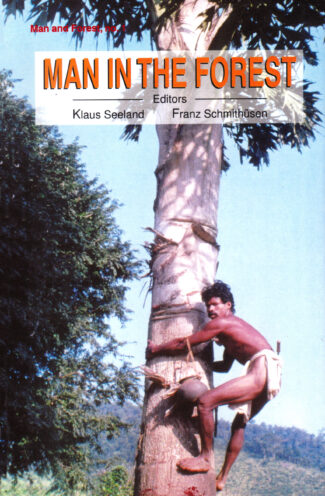
The articles examine the indigenous knowledge on trees and forests among tribal communities from diverse regions of India, particularly the significance of such knowledge for use and management of natural resources.
In the management of renewable resources, forests have undeniably a vital role. And today, more than ever before, their conservation is an urgency. In view of this dire necessity, Man in the Forest tries to highlight the high relevance of indigenous knowledge of Indian tribal communities in the sustainable management of forests/local resources more specially against the growing challenges of economic development vis-a-vis environmental hazards and a declining resource base. A scientific inquiry into the area of indigenous knowledge is basically an effort to discover/rediscover (in the tribals traditional modes of production and conservation) appropriate means to cope with the problems of modernity affecting largely the lives of the poor: not only in precarious environments, but amidst fast-depleting local resources as well. Essentially a selection of papers: based on cross-cultural, interdisciplinary investigations, the book takes a critical look at both the ascribed benefits and limitations of indigenous knowledge in general, and with regard to forest management by local tribal people in particular. Also including, contextually, an overview of the various aspects of forests lifestyles, forest use, and management of natural resources in different climatic and cultural zones on the subcontinent, the authors emphasize the social meaning of forests as a cultural legacy with case studies from different regions of India, namely, Arunachal Pradesh, Himachal Pradesh, Karnataka, Madhya Pradesh, Orissa, Rajasthan, and Uttar Pradesh. It is the first volume in the the newly-launched series about Man and Forest in South Asia, putting together research findings that represent accounts of experience and empirical evidence in the fields of forest management, social anthropology, ethno-botany, economy, forest policy and cultural history.
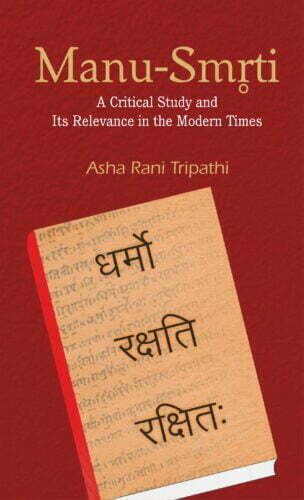
The present book is an effort to bring together all scattered materials related to different topics contained in Manu-Smriti. The book also aims to diffuse many of the doubts related to certain topics contained in Manu-Smriti, such as status of brahmana, shudra and woman.
Manu-Smriti is one of the most coveted and popular works of ancient India. It comprises codes that are needed for an ideal, peaceful and harmonious society. The entire Manu-Smriti revolves around the Vedic concept of rita or dharma. The concepts of purusharthas, ashramas and varnas have their roots in dharma. These concepts were meant to make the life of every member of the society fruitful and purposeful. The codes prescribed by Manu became an authority on ancient laws and were put in practice. The scholars working in different fields of sociology, religion, philosophy, ethics, ancient laws and politics are bound to consult Manu-Smriti for some reason or the other.
The present book is an effort to bring together all scattered materials related to different topics contained in Manu-Smriti. The book also aims to diffuse many of the doubts related to certain topics contained in Manu-Smriti, for example, status of brahmana, shudra and woman. The analysis of topics such as human values, raja-dharma and Manus codes on crime and punishment has been presented in this book in a lucid style. All these topics bear great relevance even in modern times. The volume tries to maintain the originality of Manus concepts through rational and honest approach. The book also includes few modern subjects like economics, ecosystem management and biodiversity conservation that have been dealt by Manu in a scientific manner.
This book will benefit all those who want to know about the rules and practices that governed our ancient history, pertaining to all the aspects of human life.

The work examines the early history of the Marwari community its social, religious, cultural and caste identities and its commercial activities in the eastern region of India, mainly its industrial activities and cultural and political contributions. Based on surveys and references to government records, it highlights qualitites of the Marwaris that have helped them achieve success in their pioneering efforts.
The migration of a community to a specific region and its prosperous growth there, is dependent on a number of socio-economic factors that require in-depth research to understand the nuances of change and complexities of the communitys interaction with the society, economy and polity of the region. This book attempts a study on these lines with respect to the settlement and growth of the Marwari community in the northern districts of West Bengal, throwing light on different aspects of their development as an important business community in the region. Based on surveys and references to district gazetteers, government records as well as articles in newspapers and magazines, the work covers the early history of the Marwari community including its social, cultural, religious and caste identities. It goes into the nature of the Marwari peoples commercial pursuits in the districts under study: their industrial activities, and cultural and political contributions. It deals with significant changes on their part, like their switchover from money-lending to money-investing business, in order to flourish in the settled region and studies the role of the Marwari merchants and entrepreneurs in trade and commerce activities in the region, particularly in import and export. It also highlights their philanthropic nature, power of adaptability, broad outlook and other aspects that have helped them mingle with the locals and achieve success in their pioneering efforts.
| There are no products |